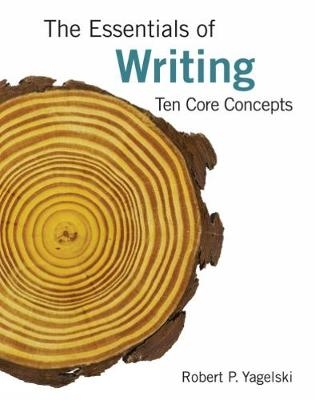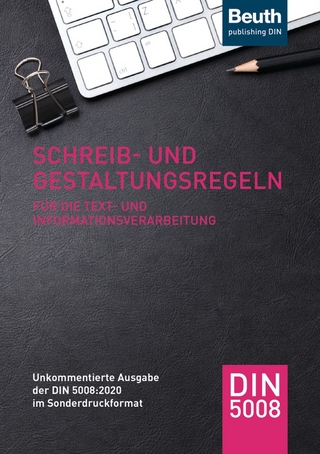
The Essentials of Writing
CENGAGE Learning Custom Publishing (Verlag)
978-1-337-28419-6 (ISBN)
- Titel erscheint in neuer Auflage
- Artikel merken
Robert P. Yagelski is Associate Vice Provost and Director of the Program in Writing and Critical Inquiry and Professor of English Education in the Department of Educational Theory and Practice at the State University of New York (SUNY) at Albany. He also teaches courses at SUNY-Albany in writing, composition theory and pedagogy, critical pedagogy, and qualitative research methods and helps prepare secondary school teachers. Considered a leading voice in composition theory, Professor Yagelski is widely published in the major journals in the field. He is also director of the Capital District Writing Project, a site of the National Writing Project, and former director of the SUNY-Albany Writing Center. He earned his Ph.D. in Rhetoric and Composition from The Ohio State University.
1. Why We Write.
Understanding Writing. Writing in College. Writing in the Workplace. Writing as a Citizen. Writing to Understand Ourselves.
2. Ten Core Concepts for Effective Writing.
Core Concept 1: Writing Is a Process of Discovery and Learning. Core Concept 2: Good Writing Fits the Context. Core Concept 3: The Medium Is Part of the Message. Core Concept 4: A Writer Must Have Something to Say. Core Concept 5: A Writer Must Support Claims and Assertions. Core Concept 6: Purpose Determines Form, Style, and Organization in Writing.
Core Concept 7: Writing Is a Social Activity. Core Concept 8: Revision Is an Essential Part of Writing. Core Concept 9: There Is Always a Voice in Writing, Even When There Isn't an I. Core Concept 10: Good Writing Means More Than Good Grammar.
3. The Core Concepts in Action.
Step 1: Discover and Explore a Topic. Step 2: Examine the Rhetorical Context. Step 3: Select an Appropriate Medium. Step 4: Have Something to Say. Step 5: Back Up What You Say. Step 6: Establish a Form and Structure for Your Project. Step 7: Get Feedback. Step 8: Revise. Step 9: Strengthen Your Voice. Step 10: Make It Correct.
4. A Student Writer Applies the Core Concepts.
5. Working with Ideas and Information.
Developing an Academic Writing Style. Writing Effective Paragraphs. Summarizing and Paraphrasing. Synthesizing. Framing. Introductions. Making Transitions.
6. Designing Documents.
Understanding Document Design as a Rhetorical Tool. Principles of Document Design. Working with Visual Elements. Designing Effective Documents: Three Sample Projects.
7. Finding Source Material.
Understanding Research. Determining What You Need. Understanding Sources. Developing a Search Strategy. Finding Appropriate Sources.
8. Evaluating Sources.
Determining Whether a Source Is Trustworthy. Evaluating Source Material for Your Rhetorical Purposes.
9. Using Source Material.
Quoting from Sources. Additional Guidelines. Avoiding Plagiarism.
10. Citing Sources Using MLA Style.
Two Main Components in MLA Style. Creating In-Text Citations in MLA Style. Creating a Works Cited Page in MLA Style. Sample MLA-Style Research Paper.
11. Citing Sources Using APA Style.
Two Main Components in APA Style. Creating In-Text Citations in APA Style. Creating a Bibliography in APA Style. Sample APA-Style Research Paper.
12. Avoiding Common Problems in Style, Grammar, and Usage.
Strategies for Avoiding Errors. Coordination, Subordination, and Parallelism. Common Sentence-Level Problems. Common Pronoun Errors. Word Choice and Style. Common Punctuation Errors.
| Erscheinungsdatum | 11.11.2016 |
|---|---|
| Verlagsort | Mason, OH |
| Sprache | englisch |
| Gewicht | 553 g |
| Themenwelt | Geisteswissenschaften ► Sprach- / Literaturwissenschaft ► Literaturwissenschaft |
| Geisteswissenschaften ► Sprach- / Literaturwissenschaft ► Sprachwissenschaft | |
| Sozialwissenschaften ► Pädagogik | |
| ISBN-10 | 1-337-28419-X / 133728419X |
| ISBN-13 | 978-1-337-28419-6 / 9781337284196 |
| Zustand | Neuware |
| Haben Sie eine Frage zum Produkt? |
aus dem Bereich


